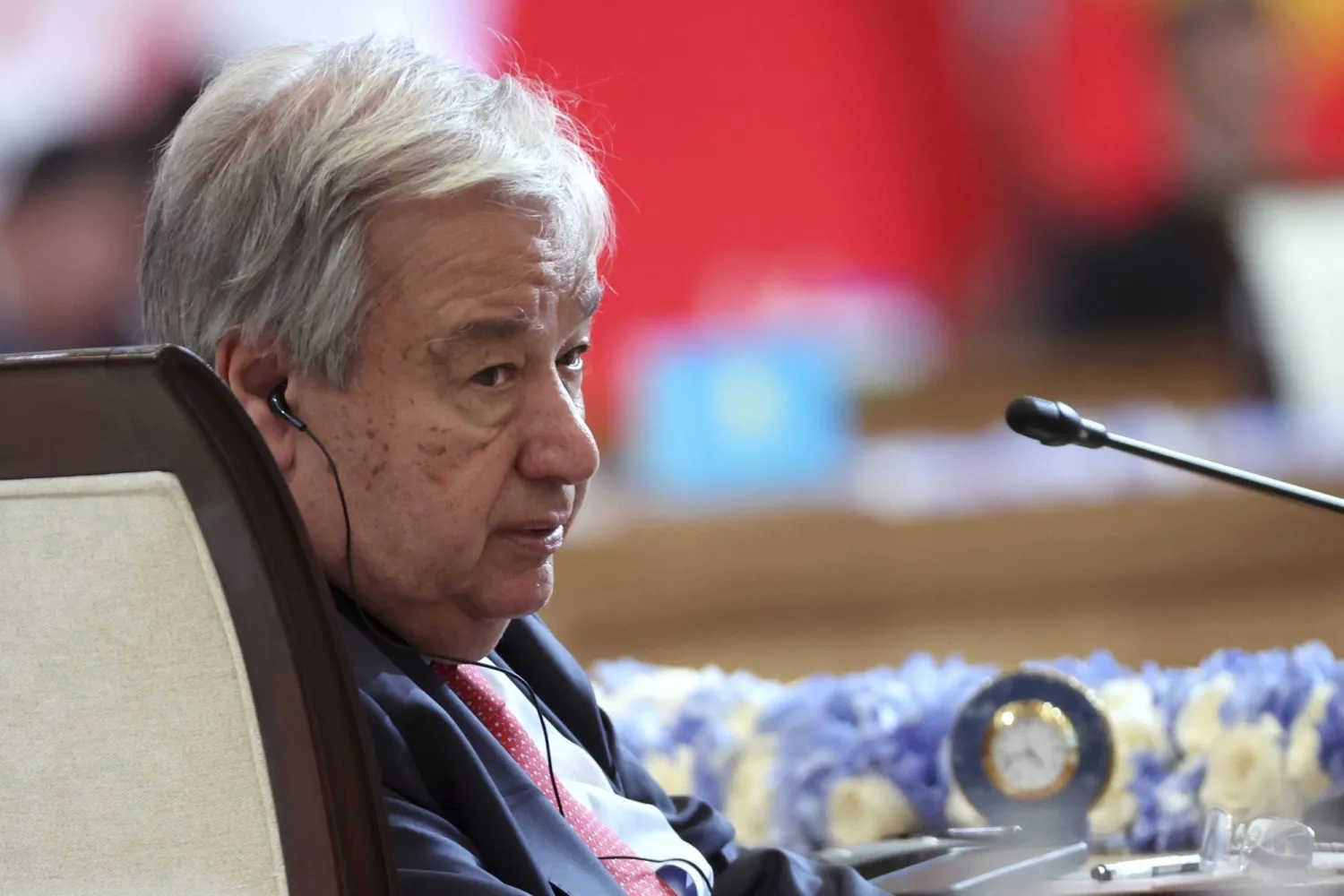The United Nations chief appealed for funding Friday for the beleaguered UN agency helping Palestinian refugees in Gaza and elsewhere in the Middle East, accusing Israel of issuing evacuation orders that force Palestinians “to move like human pinballs across a landscape of destruction and death.”
Secretary-General Antonio Guterres told a donor’s conference that the agency, known as UNRWA, faces “a profound funding gap.”
UNRWA Commissioner-General Philippe Lazzarini said at the start of the conference that the agency only had funds to operate through August, The Associated Press said.
At the end, he told reporters that, while the total amount in pledges won’t be known until next week, he is confident there will be enough new money in its $850 million annual budget to keep the agency running until the end of September.
UNRWA’s 30,000 staff provide education, primary health care and other development activities to about 6 million Palestinian refugees in Gaza, the West Bank, Jordan, Lebanon and Syria.
In the coming months, Lazzarini said UNRWA will be seeking funds to keep its operations going through December — and for emergency appeals for $1.2 billion for the Gaza war and $460 million for the Syria crisis, both of which are only 20% funded.
Without financial support to UNRWA, secretary-general Guterres said “Palestinian refugees will lose a critical lifeline and the last ray of hope for a better future.”
The UN chief reserved his harshest words for Israel’s ongoing military offensive in Gaza, which has affected its entire Palestinian refugee population.
“The extreme level of fighting and devastation is incomprehensible and inexcusable — and the level of chaos is affecting every Palestinian in Gaza and all those desperately trying to get aid to them.
“Just when we thought it couldn’t get any worse in Gaza — somehow, appallingly, civilians are being pushed into ever deeper circles of hell,” the secretary-general said.
Guterres said Israel’s latest evacuation orders in Gaza City have come with more civilian suffering and bloodshed.
Nothing justifies Hamas’ Oct. 7 attacks in southern Israel, he said, and “nothing justifies the collective punishment of the Palestinian people.”
The Hamas attack killed some 1,200 people — mostly civilians — and led to the abduction of about 250 people. Since then, Israeli ground offensives and bombardments have killed more than 38,300 people in Gaza, according to the territory’s Health Ministry, which does not distinguish between combatants and civilians in its count.
Guterres said UNRWA hasn’t been spared: “195 UNRWA staff members have been killed, the highest staff death toll in UN history.”
For years, UNRWA has been underfunded, but this year was dire following Israeli allegations that 12 of the agency’s 13,000 workers in Gaza participated in Hamas’ Oct. 7 surprise attack that sparked the ongoing war in Gaza. UNRWA immediately suspended them.
As a result of the allegations, 16 countries halted funding for UNRWA, amounting to about $450 million.
Lazzarini told reporters that 14 donors have officially resumed funding and he believes “very soon” a 15th country — the United Kingdom — will come back.
The 16th country is the United States, which had been the biggest donor to UNRWA. The US Congress has prohibited any payments to the agency until March 25, 2025.
Just before the conference opened, Slovenia Foreign Minister Tanja Fajon announced that 118 countries had signed a declaration of strong support for UNRWA, which Lazzarini welcomed.
He said the United States was among the signatories, though it didn’t attend the conference. “But it was a very good sign … which indicates that they are also providing the necessary political support to the agency,” Lazzarini said.
UN Chief Urges Funds for Palestinians, Saying Israel is Forcing Gazans 'to Move Like Human Pinballs'

UN Secretary-General Antonio Guterres attends SCO Plus format meeting during Shanghai Cooperation Organization (SCO) summit in Astana, Kazakhstan, Thursday, July, 4, 2024. (Sergei Savostyanov, Sputnik, Kremlin Pool Photo via AP)

UN Chief Urges Funds for Palestinians, Saying Israel is Forcing Gazans 'to Move Like Human Pinballs'

UN Secretary-General Antonio Guterres attends SCO Plus format meeting during Shanghai Cooperation Organization (SCO) summit in Astana, Kazakhstan, Thursday, July, 4, 2024. (Sergei Savostyanov, Sputnik, Kremlin Pool Photo via AP)
لم تشترك بعد
انشئ حساباً خاصاً بك لتحصل على أخبار مخصصة لك ولتتمتع بخاصية حفظ المقالات وتتلقى نشراتنا البريدية المتنوعة







